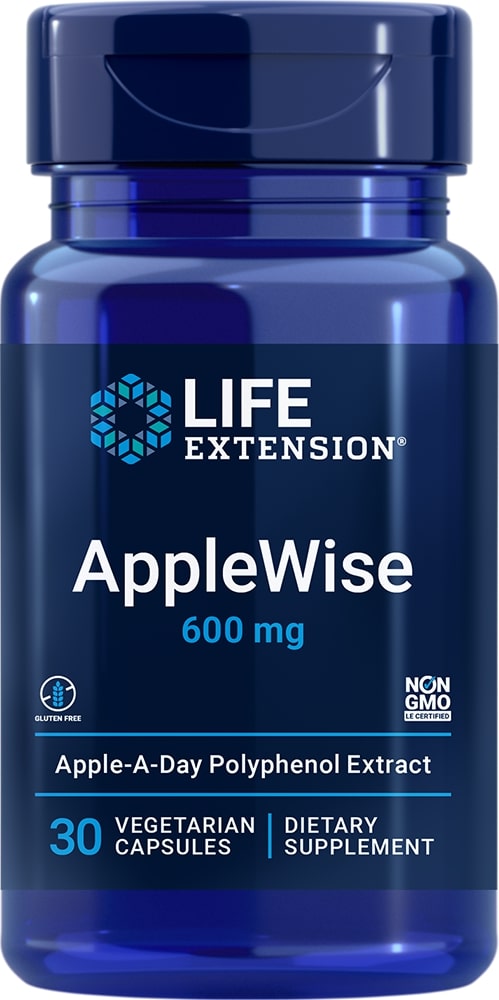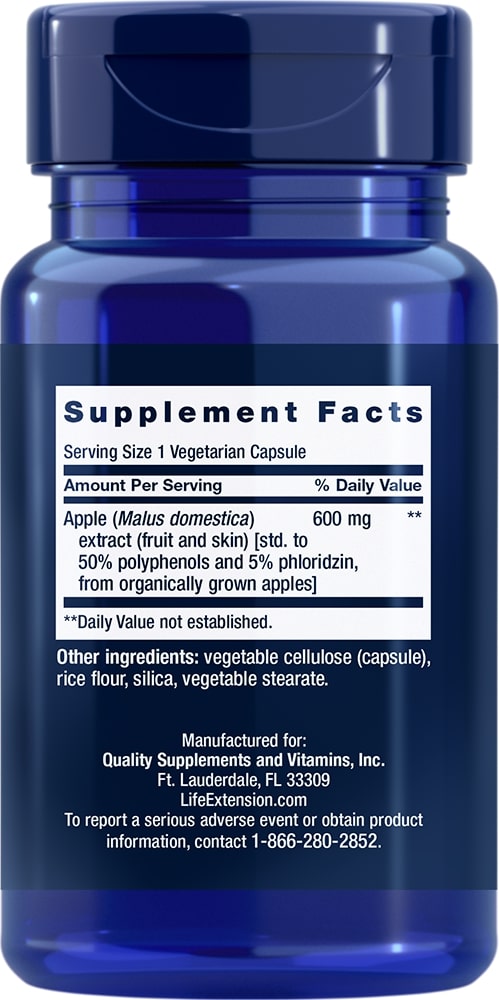Passwords are case sensitive
AppleWise, 600 mg, 30 vegetarian capsules
Return to Anti-Aging & LongevityApple polyphenols are powerful antioxidants. They help inhibit glycation and promote a healthy inflammatory response. Apple polyphenols also help support a healthy cardiovascular system, cell division, blood sugar levels already within normal range and healthy immune function.
Apple Polyphenols May Extend Life
Apples contain high levels of well-known fruit polyphenols, mainly concentrated in their skins.1 Preclinical studies have shown that apple polyphenols promote expression of genes related to cellular antioxidant enzymes and increase the lifespan of various species by 10 to 12 percent.2-5
Phloridzin Benefits
A specific apple polyphenol called phloridzin is especially active against glycation, a metabolic process that contributes to some aspects of aging. Phloridzin and phloretin (which is produced from phloridzin by intestinal bacteria) help guard against glycation by maintaining blood sugar levels already within normal range, inhibiting glycation reactions between sugars and proteins, and inhibiting glycative damage to vulnerable molecules in the body.
Phloridzin is well-known to inhibit intestinal cells’ absorption and transport of sugar into the bloodstream.6,7 One mechanism behind this effect appears to be the quelling of oxidative stress and helping support a healthy inflammatory response.8 Studies also show that phloridzin and phloretin promote normal insulin response and uptake of glucose by cells, helping to maintain normal blood glucose levels.9,10
Excess sugar molecules circulating in the bloodstream can be converted into carbonyl molecules that can then react with proteins and trigger formation of advanced glycation end-products (AGEs).11 Phloridzin and phloretin have been shown to trap existing carbonyl molecules and inhibit formation of new carbonyl compounds and AGEs.12-15
Supports Cardiovascular Health
Findings from a randomized controlled clinical trial suggest apple skin polyphenols may support heart health by encouraging healthy blood vessel function. In the study, eating apples with polyphenol-rich skins for four weeks was associated with better vascular responsiveness to blood flow than eating apples with no skins.16
Studies in animals and humans also suggest that apple polyphenols can help maintain healthy triglyceride levels already within normal range and support lipid metabolism. By blocking pancreatic lipase, an enzyme required to break down dietary triglycerides, apple polyphenols slow triglyceride absorption. By enhancing the activity of lipoprotein lipase, an enzyme that breaks down triglycerides in blood lipoproteins, they support healthy lipid metabolism.17,18
Supports Colon Health
Polyphenols from apple skins promote colon health by scavenging oxygen free radicals, a potent means of increasing cellular mechanisms and supporting DNA function.19 They also help encourage natural antioxidant processes in intestinal cells for protection, support a healthy inflammatory response and have been shown to help protect the DNA of intestinal cells.20-23
Since health-conscious people obtain a wide range of polyphenols (such as green tea and pomegranate extracts), a daily dose of 300 mg to 600 mg of apple polyphenols may be all that is needed to obtain desired benefits.
|
||||||||
| Dosage and Use | ||||||||
|
||||||||
Dosage and Use Take one (1) capsule one to four times daily, or as recommended by a healthcare practitioner.
$15.00
01625

